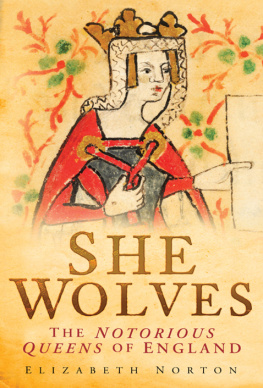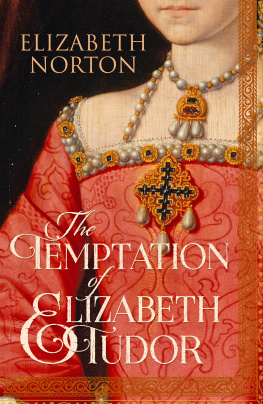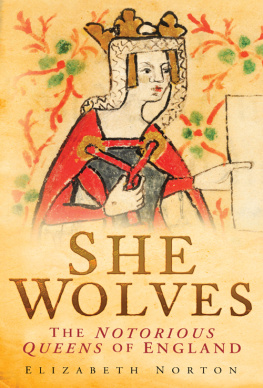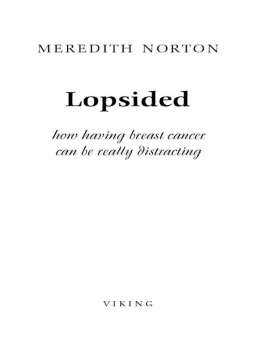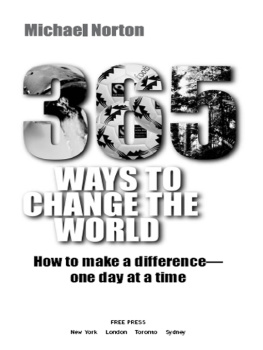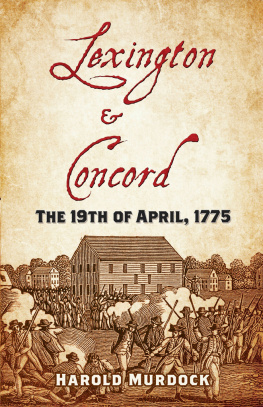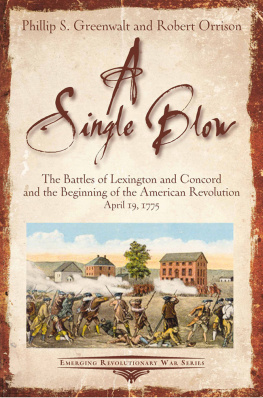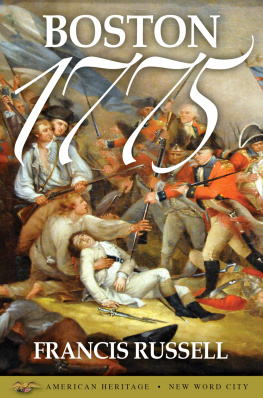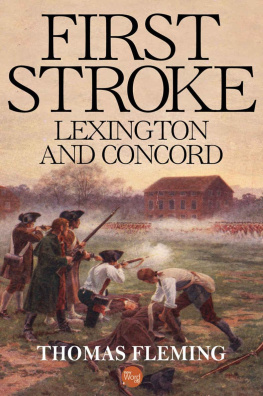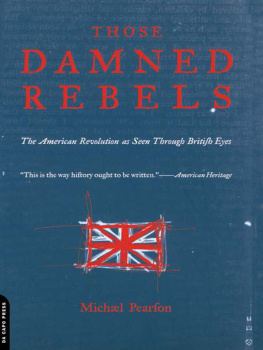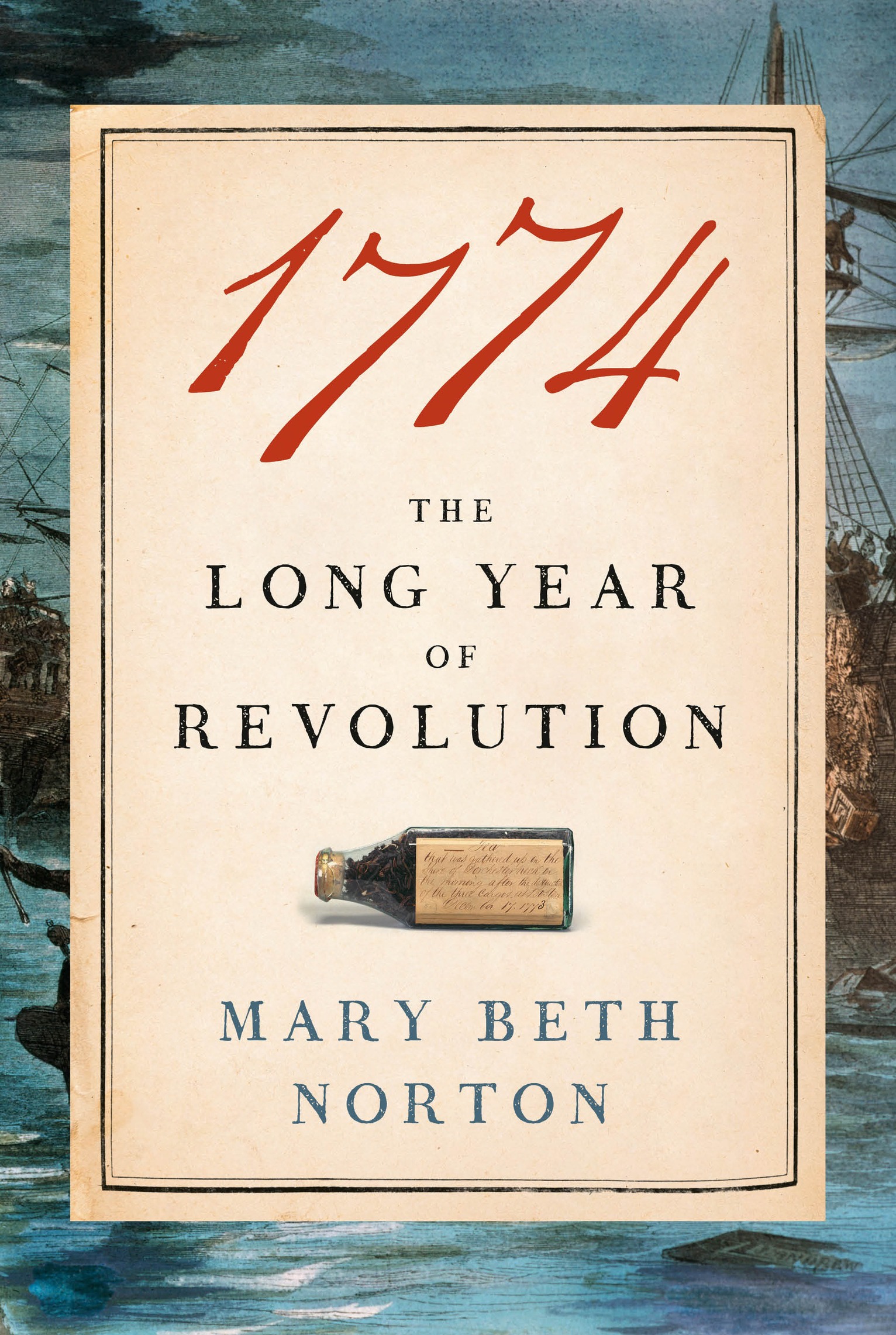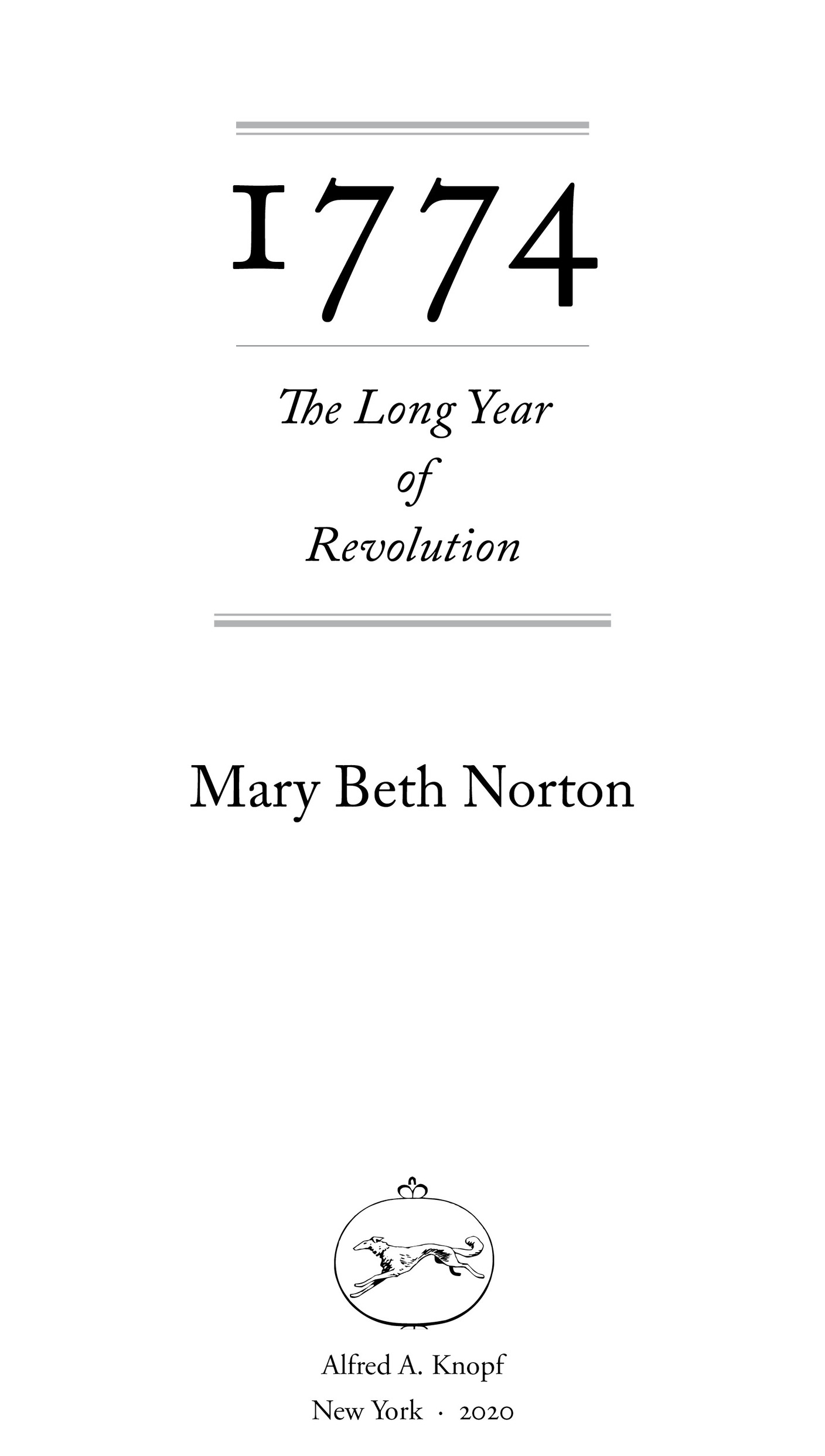A LSO BY M ARY B ETH N ORTON
Separated by Their Sex: Women in Public and Private in the Colonial Atlantic World
In the Devils Snare: The Salem Witchcraft Crisis of 1692
Founding Mothers & Fathers: Gendered Power and the Forming of American Society
Libertys Daughters: The Revolutionary Experience of American Women, 17501800
A People and a Nation: A History of the United States (co-author)
The British-Americans: The Loyalist Exiles in England, 17741789
THIS IS A BORZOI BOOK PUBLISHED BY ALFRED A . KNOPF
Copyright 2020 by Mary Beth Norton
All rights reserved. Published in the United States by Alfred A. Knopf, a division of Penguin Random House LLC, New York, and distributed in Canada by Penguin Random House Canada Limited, Toronto.
www.aaknopf.com
Knopf, Borzoi Books, and the colophon are registered trademarks of Penguin Random House LLC.
Library of Congress Cataloging-in-Publication Data
Names: Norton, Mary Beth, author.
Title: 1774 : the long year of Revolution / Mary Beth Norton.
Other titles: Long year of Revolution
Description: First edition. | New York : Alfred A. Knopf, 2020. | This is a Borzoi book | Includes bibliographical references and index. |
Summary: A book on the American Revolution that looks at the critical long year of 1774, and the revolutionary change that took place from December 1773 to mid-April 1775, from the Boston Tea Party and the first Continental Congress to the Battles of Lexington and Concord.Provided by publisher.
Identifiers: LCCN 2019021556 (print) | LCCN 2019981577 (ebook) | ISBN 9780385353366 (hardcover) | ISBN 9780385353373 (ebook)
Subjects: LCSH: United StatesHistoryRevolution, 17751783. | Boston Tea Party, Boston, Mass., 1773. | United States. Continental Congress. | Lexington, Battle of, Lexington, Mass., 1775. | Concord, Battle of, Concord, Mass., 1775. | American loyalists.
Classification: LCC E208 .N635 2020 (print) | LCC E208 (ebook) | DDC 973.3dc23
LC record available at https://lccn.loc.gov/2019021556
LC ebook record available at https://lccn.loc.gov/2019981577
Ebook ISBN9780385353373
Cover images: (bottle) Boston Tea Party tea leaves, collected by T. M. Harris, Dec. 1773. Massachusetts Historical Society, Boston, Massachusetts, USA / Bridgeman Images; (background) Boston Tea Party (detail). Bettmann / Getty Images
Cover design by Jenny Carrow
v5.4
ep
For Martha Farnsworth
and
To the Memory of Mary Elizabeth Lunny Norton
Come, come, my brave boys, from my song you shall hear,
That well crown Seventy-four, a most glorious year.
THE NEW-YORK JOURNAL , AUGUST 18, 1774
I almost wish to live to hear the triumphs of the Jubilee in the Year 1874, to see the medals, pictures, fragments of writings, &c., that shall be displayed to revive the memory of the proceedings of the Congress in the year 1774.
DUNLAPS PENNSYLVANIA PACKET, NOVEMBER 14, 1774
Contents
ACKNOWLEDGMENTS
Any project that one has thought about for as long as I have thought about this book (since approximately 1972) has racked up the need for many acknowledgments. Over the years, students in my regularly taught undergraduate lecture course, Age of the American Revolution, helped to clarify my ideas, but special thanks are due to the enrollees, both graduate and undergraduate, in my 2012 seminar on the Revolution, and especially Tim Sorg, who generously shared research notes with me. A conversation with Holly Brewer as I began to think seriously about the shape of the book turned out to be crucial to its conceptualization. I also employed students as research assistants; thanks to the graduate students Molly Reed and Jacqueline Reynoso; and to the undergraduates Rachael Comunale, Caroline Estill (a Dartmouth student whose hometown is Ithaca), and Anne Powell. Rachael and Anne spent many hours transcribing innumerable political broadsides, a source that turned out to be more important than I anticipated; I am particularly grateful to them.
The audiences of talks based on my research supplied useful feedback; I thank attendees at St. Josephs University, Drayton Hall, West Virginia University, the Omohundro Institute, and other participants in two conferences: Constitutional Convention: 225th Anniversary of the Ratification at the University of Georgia in 2013, and Propaganda, Persuasion, and the Press and the American Revolution, 17631783 at the University of Hong Kong in 2016, sponsored by the Thomas Jefferson Memorial Foundation. My longtime friend, the late Pauline Maier, also participated in the Georgia conference. She strongly encouraged me to pursue this topic, and I had looked forward to receiving feedback from her as well, but her early death in August 2013 dashed those hopes.
As was true many years ago when I wrote my dissertation, I appreciated the wise counsel of Bernard Bailyn on an early draft of chapter 1. Special thanks go to my Cornell colleagues, who participated in a discussion of a draft of chapter 2 at our Comparative History Colloquium, where I benefited notably from the comments of Aaron Sachs, Robert Travers, and Rachel Weil. Michael McDonnell kindly read the entire penultimate manuscript. J. B. Heiser critiqued many of the chapters, identifying passages that needed clarification and amplification for readers who were not historians or specialists in the revolutionary period.
I could not have completed the extensive research required for this book without the assistance of librarians and archivists in many repositories. As always, I owe a great deal to Cornells Olin and Kroch Libraries, where Virginia Cole, Katherine Reagan, and the now retired Peter Hirtle and Anne Kenney, along with the interlibrary loan staff, supplied help above and beyond what any historian could reasonably request or expect. I also appreciated the ability to consult the online databases Americas Historical Newspapers (Readex) and Accessible Archives, to both of which Cornell subscribes. At Columbia University, I relied on Susan Hamson; at the New-York Historical Society, on Edward OReilly and Tammy Kiter; at William and Mary, on Amy Schindler; and on Mary Jo Fairchild at the South Carolina Historical Society. The staffs of the reading rooms of the Library of Virginia in Richmond, the Alderman Library at the University of Virginia, the Massachusetts Historical Society, the New England Historic Genealogical Society, the Boston Athenaeum, and the New York Public Library were unfailingly helpful, as were those at the Map Room of the National Archives at Kew and the Asia and Africa Room at the British Library, at both of which problems with inadequate indexes caused me to need additional assistance. At the Huntington Library, where I spent a month reading original pamphlets published between late 1773 and early 1775, Jaeda Snow and Alisa Monheim efficiently saw to it that I had access to multiple copies of the same publications, which proved eye-opening in their revelation of different printings, even if the pamphlets did not supply the marginalia I sought.
At other archives, I did not visit in person but nevertheless received copies of relevant documents from helpful staff members: Graham Duncan (South Caroliniana Library); Katherine Wilkins (Virginia Historical Society); Steve Rice (Connecticut State Library); Barbara Austen (Connecticut Historical Society); Sarah Bost (University of North CarolinaChapel Hill); and Stephanie Fong (Newberry Library).


